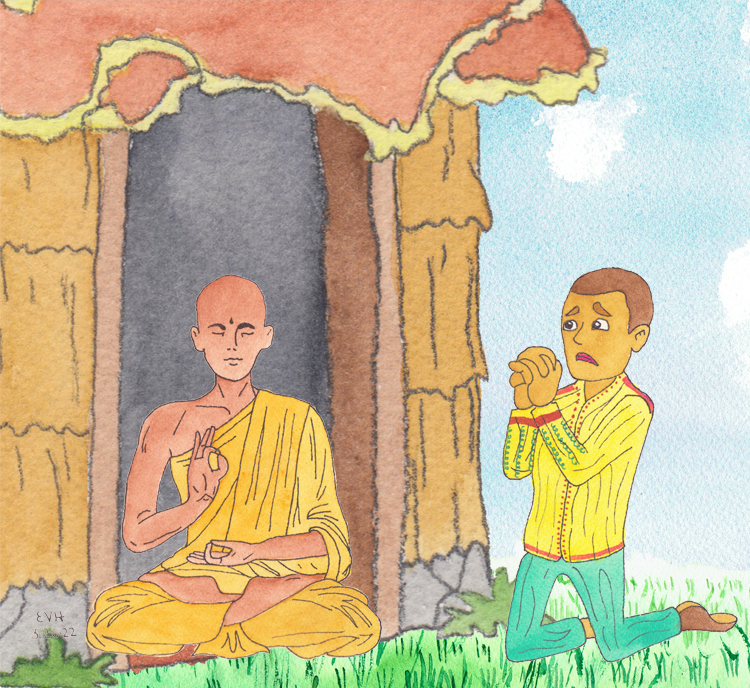
Jataka 310
Sayha Jātaka
The Story of Sayha
as told by Eric Van Horn
originally translated by H.T. Francis and R.A. Neil, Cambridge University
originally edited by Professor Edward Byles Cowell, Cambridge University
To someone who has not attained some significant progress on the Buddha’s Path, this story may sound a little like a fantasy. But even modest progress on the path can bring such great joy and happiness, that conventional, worldly pleasures lose their appeal.
“No throne on earth.” The Master told this story while in residence at Jetavana. It is about a backsliding brother, who saw a beautiful woman while going his alms round. Afterwards he became discontented and lost all pleasure in the Dharma. So the monks brought him before the Blessed One. The Blessed One said to him, “Is it true, brother, what I hear, that you are discontented?” He confessed that it was so. When the Master learned of his discontent, he said, “Why, brother, are you longing for the world after taking orders in a path that leads to freedom? Wise men of old, when offered the dignity of a family priest, rejected it and adopted the life of a recluse.” And he told them this story from the past.
Once upon a time when Brahmadatta was reigning in Benares, the Bodhisatta was conceived in the womb of the brahmin wife of the King’s chaplain. He was born on the same day as the King’s son. And when the King asked his ministers if any child had been born on the same day as his son, they said, “Yes, Sire, a son of your family priest.” So the King had him brought and given into the charge of nurses to be carefully tended together with the young prince. And they both had the same ornaments to wear and had exactly the same things to eat and drink.
When they had grown up, they went together to Takkasilā University, and as soon as they had attained proficiency in all the sciences, they returned home.
The King made his son viceroy and bestowed great honor upon him. From that time on the Bodhisatta ate, drank, and lived with the prince, and there was a firm friendship between them. By and by, at the death of his father, the young prince ascended the throne and enjoyed great prosperity. The Bodhisatta thought, “My friend now rules the kingdom. When he sees a fitting opportunity, he will certainly give me the office of his family priest. Why would I want the life of a householder? I will become a recluse and devote myself to solitude.”
So he saluted his parents and—having asked their permission to take orders—he gave up his worldly fortune. He set forth quite alone to the Himālaya country. There on a charming spot he built a hermitage for himself. And adopting the holy life of a recluse, he developed the Five Faculties (1) faith/confidence, 2) energy, 3) mindfulness, 4) concentration/samadhi and 5) wisdom/insight) and the Attainments (jhānas), and he lived in the enjoyment of the pleasure of the mystic life.
At this time the King remembered him and said, “What has become of my friend? He is nowhere to be seen.” His ministers told him he had taken orders and was living, they heard, in some delightful grove. The King asked where he was living, and he said to a councilor named Sayha, “Go and bring my friend back with you. I will make him my chaplain.” Sayha readily agreed. He left Benares, and in the course of time he reached a frontier village. He found a place to stay there. Then he went with some foresters to the place where the Bodhisatta lived. He found him sitting like a golden statue at the door of his hut. After saluting him with the usual compliments, he sat at a respectful distance and addressed him: “Reverend sir, the King desires your return. He is anxious to raise you to the dignity of his family priest.” The Bodhisatta replied, “If I were to receive not merely the post of chaplain but all Kāsi and Kosala and the realm of India and the glory of a Universal Empire, I would refuse to go. The wise do not again take up the defilements they have abandoned any more than they would swallow the phlegm they have coughed up.” So saying he repeated these stanzas:
No throne on earth should tempt me to my shame,
No sea-girt realm, safe-guarded in the deep.
Accursed be the lust of wealth and fame
That dooms poor man in suffering worlds to weep.
Better through earth a homeless waif to stray,
And bowl in hand to beg from door to door,
Then as a king, to sinful lusts to prey,
To bear a tyrant rule and vex the poor.
Again and again Sayha begged the Bodhisatta to return, but this was to no avail. The Bodhisatta repeatedly rejected his offer. And Sayha, being unable to prevail upon him, saluted him, and returned and told the King of his refusal to come.

Figure: No throne on earth should tempt me
When the Master had brought his lesson to an end, he taught the Four Noble Truths. At the conclusion of his teaching, the backsliding brother attained the fruition of the First Path (stream-entry). Many others too experienced like fruits of stream-entry. At the conclusion of this the Buddha identified the birth: “At that time Ānanda was the King, Sāriputta was Sayha, and I was the family priest.”
